Books
Books
published in 2025

In the Delirium of the Simulation: Baudrillard Revisited
Third edition featuring afterword by Alessandro Sbordoni & several appendices, including a new translation & edit of “Taylor Swift Does Not Exist”.
This is a monumental and extensive work from someone who is arguably the most well-versed scholar of Baudrillard, Deleuze & Laruelle in the German-speaking world, Achim Szepanski, the original founder of Mille Plateaux, Force Inc Music Works and NON. This book is dedicated to Jean Baudrillard, who would be described by Achim as the most radical and advanced stimmung in Philosophy. Through this comprehensive and devouring analysis of Baudrillard’s work, the author presents a gripping account of their own philosophy; alongside his magnum opus Die Ekstasie der Spekulation, this book, In the Delirium of the Simulation, provides the strongest case for what might be called, in light of his passing, Szepanskism or Szepanskian Economics.
From Finance, to non-philosophy and radical experimental music, Szepanski is an anomalous and unique theoretician with one hell of a history.
CONTENTS:
- Metabox of Terms: Simulation, Code, Hyperreality, Fractal, Seduction and Implosion
- Baudrillard's Maximisation Hypothesis: the System and the Other
- Baudrillard & Marxism: Signs, Production and Money
- Distinguishing the Consumer System (or Shopping Mall) from the Landfill
- Baudrillard & the Financial Simulacrum
- Excursus on Jonathan Beller's World Computer
- Hyperreality & Artificial Intelligence
- Baudrillard & Quantum Theory
- Afterword: Hyperculture by Alessandro Sbordoni
- Appendix 1: Taylor Swift Does Not Exist
- Appendix 2: Baudrillard: After the Orgy
- Appendix 3: Imagination & Reality: Psychoanalysis vs Baudrillard

It goes like this
It goes like this: lower and lower and lower and... Bring down all these towers! You're sinking into this. I'm alone and we don't care. Am I just passing time?
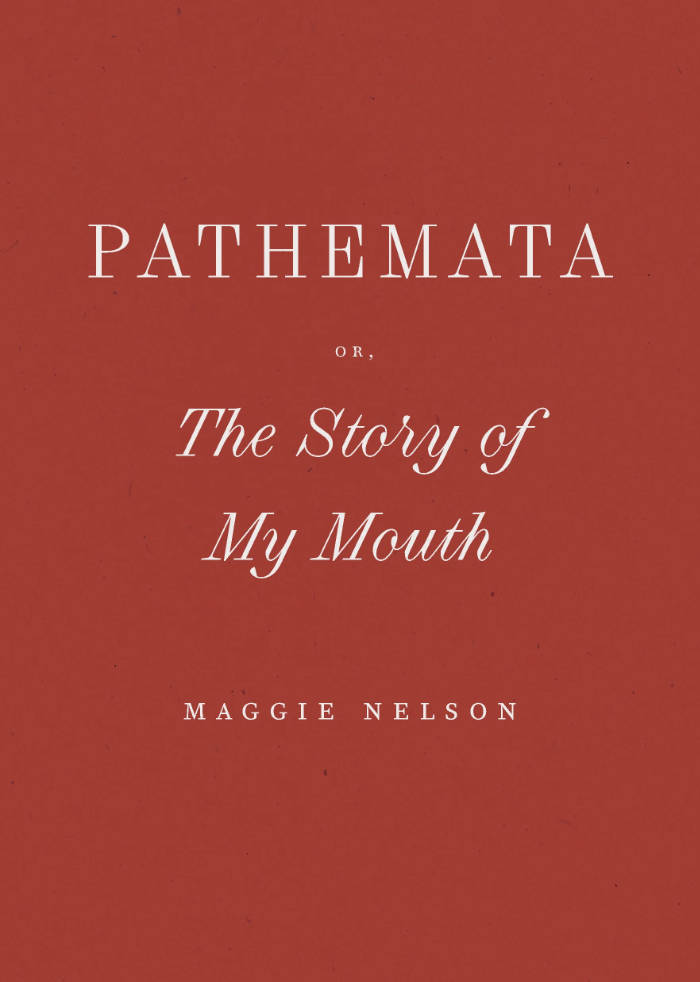
Pathemata, Or, the Story of My Mouth
Pathemata, Or, The Story of My Mouth is an experiment in interiority written in the pandemic studio. Something of a companion piece to 2009's Bluets, Pathemata merges a pain diary chronicling a decade of jaw pain with dreams and dailies, eventually blurring the lines between embodied, unconscious, and everyday life.
In scrupulously distilled prose, Pathemata offers a tragicomic portrait of a particularly unnerving and isolating moment in recent history, as well as an abiding account of how it feels to inhabit a mortal body in struggle to connect with others. Formally inspired by Hervé Guibert's The Mausoleum of Lovers, and conceptually guided by Gilles Deleuze's notion of artist as symptomologist, Pathemata is yet another urgent innovation from Maggie Nelson in the art of life-writing.
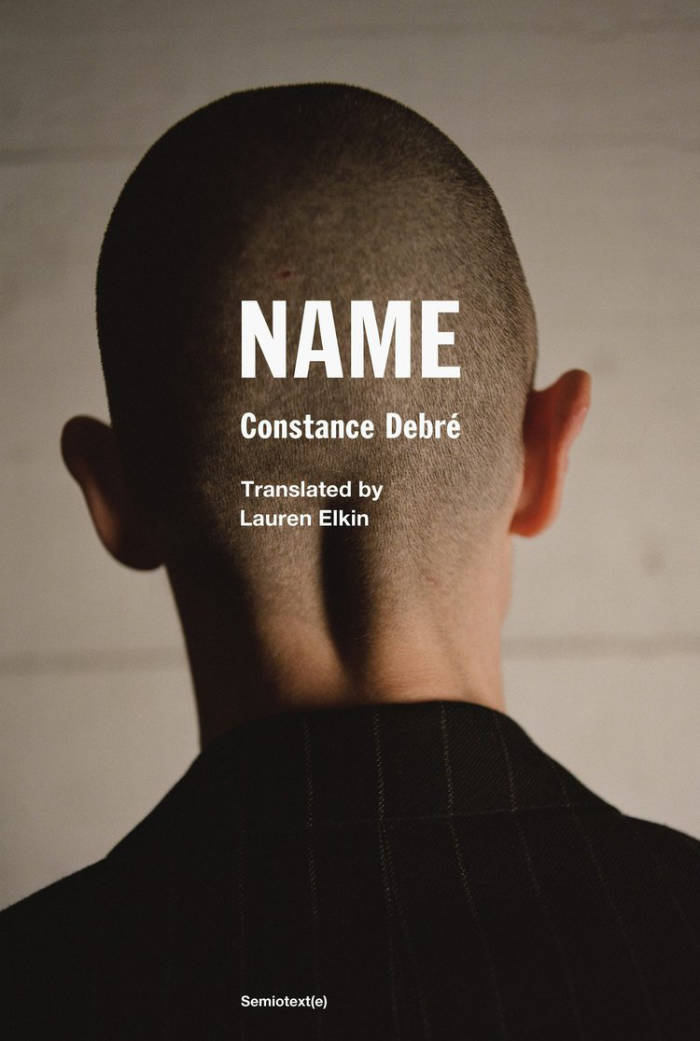
Name
Name, the third novel in Constance Debré’s acclaimed trilogy, is at once a manifesto, an ecstatic poem, and a political pamphlet. By rejecting the notion of given identity, her narrator approaches the heart of the radical emptiness that the earlier books were pursuing.
Newly single, and having recently come out as a lesbian, the narrator of Debré’s first two novels embarked on a monastic regime of exercise, sex, and writing. Using the facts of her own life as impersonal “material” for literature, Playboy and Love Me Tender epitomized what Debré (after Thomas Bernhard) has called “antiautobiography.” They introduced French and American readers to her fiercely spare prose, distilled from influences as disparate as Saint Augustine, Albert Camus, and Guillaume Dustan. “Minimalist and at times even desolate,” wrote the New York Review of Books, these works defied “the expectations of personal growth that animate much feminist literature.”
Name is Debré’s most intense novel yet. Set partly in the narrator’s childhood, it rejects Proustian notions of “regaining” the past. Instead, its narrator seeks a state of profound disownment: “We have to get rid of the idea of origins, once and for all, I’m not holding on to the corpses. … Being free has nothing to do with that clutter, with having suffered or not, being free is the void.” To achieve true freedom, she dares to enter this “void”—that is, dares to accept the pain, loss, and violence of life. Brilliant and searing, Name affirms and extends Debré’s radical project.
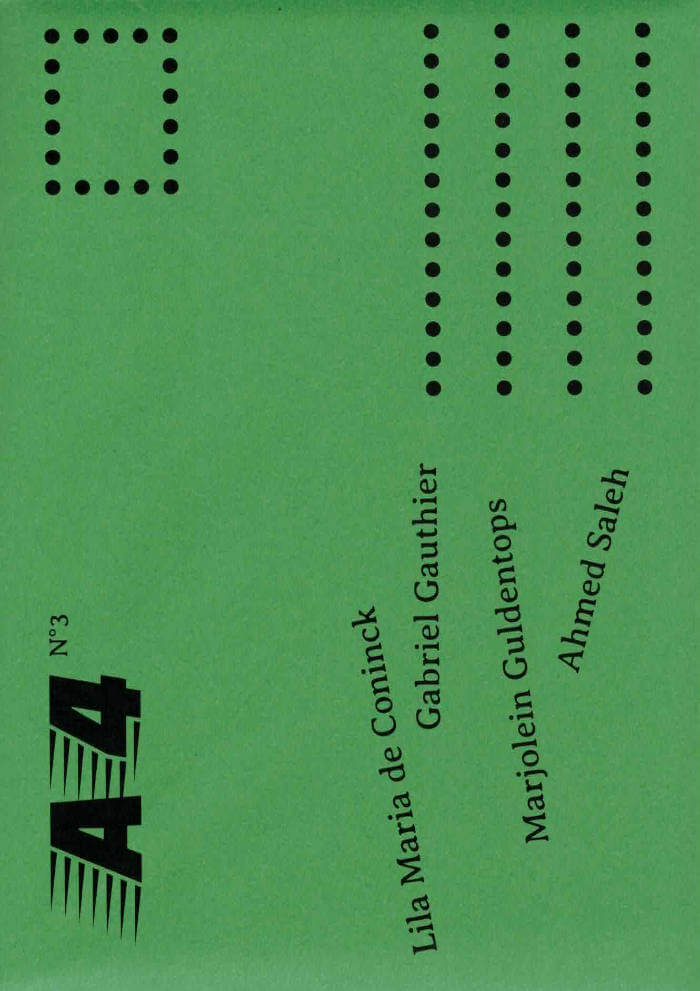
A4 review N°3
Marjolein Guldentops, Ahmed Saleh and 2 more
Founded in 2023, A4 is a poetry review which showcases and explores contemporary writings practices. Run by Littérature Supersport collective, the object is seen as the extension of their events. The review takes the form of 4 postcards which, when placed side-by-side, form an A4-sheet. A light (even precarious) format for literature that slips into the back pocket of pants and hangs on fridge doors. Each issue features unpublished texts by 4 authors. Wrapped in colors, A4 is distributed by post and available in good bookshops, in Brussels, Liège, Paris and Marseille.
This third issue presents texts by : Lila Maria de Coninck, Gabriel Gauthier, Marjolein Guldentops & Ahmed Saleh.
Ahmed Saleh (born 1998) is a Palestinian writer and poet from Gaza. He studied business administration and political science and is currently living in Brussels. Ahmed writes articles in Arabic and English, several of which have been published on various platforms.
Marjolein Guldentops (Belgium, 1994) is a visual artist, author, and performer. Her artistic practice spans various mediums, including text, video and performance. Rooted in the concept of worlding, her work explores the urban rhythms, flows, and semantics that shape perceptions of space and language in both physical and metaphysical senses.
Gabriel Gauthier is a graduate of the Beaux-arts in Paris. He writes books, performs and makes music. He has published Simurgh & Simorgh and Contra at Théâtre Typographique (2016, 2024) and Speed at Vies Parallèles (2020). He has designed pieces at the border of dance and visual arts (Cover, Rien que pour vos yeux). Space, his first novel, was published by Corti.
Lila Maria de Coninck (2004) is a Belgian creator living in The Hague. She makes music, theatre and writes poetry. The guiding principle in her works is the use of multilingualism and miscommunication to promote creativity in her mother tongue, Dutch.

Curatorial Design – A Place Between
Wilfried Kuehn, Dubravka Sekulić
The future of architecture lies in the curatorial approach. This is the thesis put forward by architect Wilfried Kuehn and theorist Dubravka Sekulić in their book Curatorial Design: A Place Between, which brings together contributions from more than 30 authors working in the fields of architecture, art, and curatorial knowledge and practice.
Architectural design and the curatorial share a non-disciplinary background, and aim to assemble diverse forms of knowledge rather than specializing. Inherently transdisciplinary, then, they are at odds with the increasing division of labor in all fields of knowledge and practice. In the face of professionalization, which limits our capacity to intervene comprehensively, design and the curatorial challenge specialization and produce relational knowledge. They intend to create an in-between place, as together they form a novel practice that—in combining heterogenous forms of knowledge—takes center stage rather than serving as a moderator or mediator of sorts. What unites them is the assertion of a relational form, the autonomy of which consists precisely in teasing out relations between different elements. What happens to architectural design when it consciously enters a relationship with the curatorial?
The book is aimed at practitioners and educators in the field of architecture and design, as well as curators and exhibition makers. It contains three photo series by Armin Linke that accompany the three sections of the book: "Public School for Architecture", "Total Reconstruction," and "Designing for Co-Habitation."
Contributions by Martina Abri, Ross Exo Adams, Thomas Auer, Giovana Borasi, Susana Caló, Brendon Carlin, Peggy Deamer, Clémentine Deliss, FICTILIS, Francesco Garutti, Maria Shéhérazade Giudici, Joyce Hwang, Anousheh Kehar, Bettina Köhler, Elke Krasny, Wilfried Kuehn, Ippolito Pestellini Laparelli, Maxim Larrivée, Matthew Leander Kalil, Mark Lee, Steve Lyons for Not An Alternative, Armin Linke, Mona Mahall, Charlotte Malterre-Barthes, Dejan Marković, Ana Miljački, Erica Petrillo, Christian Raabe, Albert Refiti, Damon Rich, Christiane Salge, Ivonne Santoyo-Orozco, Anna Schäffler, Bernd Scherer, Laila Seewang, Dubravka Sekulić, Asli Serbest, Stuart Smith, Laurent Stalder, Milica Tomić.
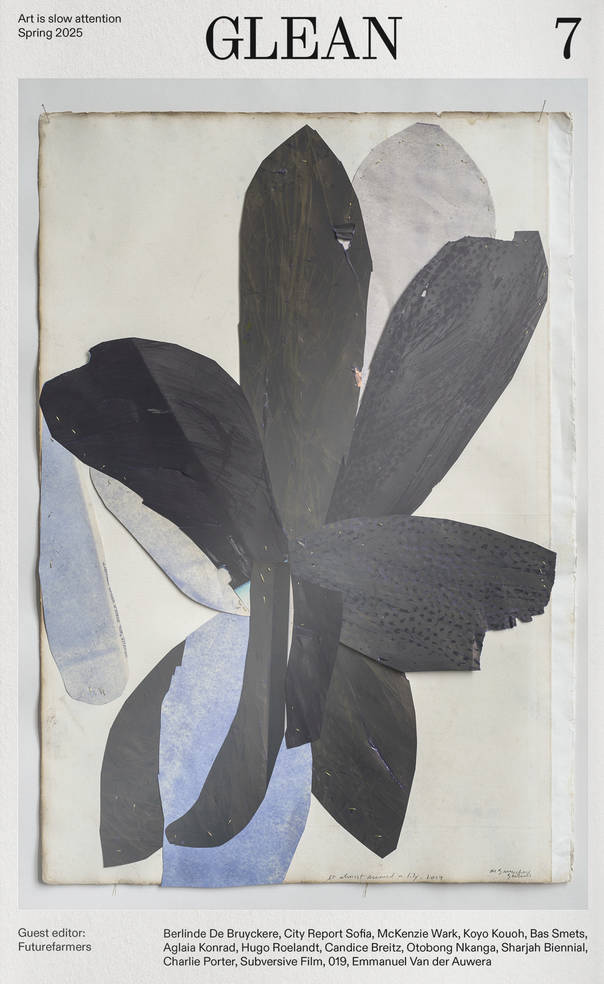
GLEAN 7 - Spring 2025
Futurefarmers, Berlinde De Bruyckere, City Report Sofia, McKenzie Wark, Koyo Kouoh, Bas Smets, Aglaia Konrad, Hugo Roelandt, Candice Breitz, Otobong Nkanga, Sharjah Biennial, Charlie Porter, Subversive Film, 019, Emmanuel Van der Auwera.
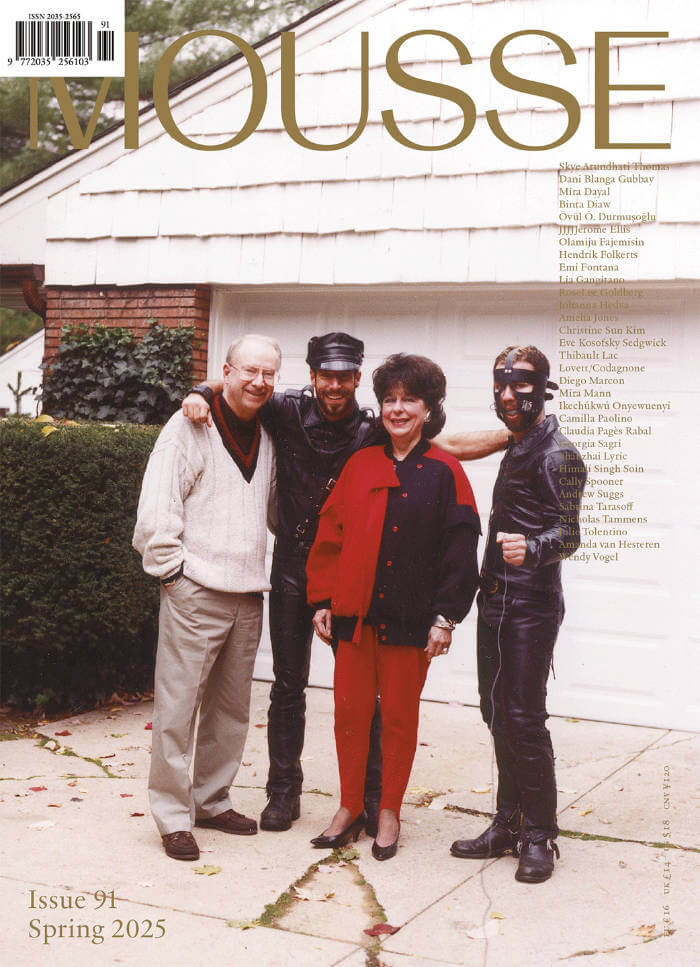
Mousse #91
Lovett/Codagnone; Sabrina Tarasoff on Diego Marcon; Ikechúkwú Onyewuenyi on JJJJJerome Ellis; Cally Spooner and Hendrik Folkerts; Himali Singh Soin; Wendy Vogel interviews pioneering art historian, curator, and founder of Performa biennial RoseLee Goldberg; Shanzhai Lyric; Amelia Jones on queer feminist literary critic Eve Kosofsky Sedgwick; Dani Blanga Gubbay; Amanda van Hesteren by Olamiju Fajemisin; Thibault Lac by Skye Arundhati Thomas; Mira Mann by Nicholas Tammens; Claudia Pagès Rabal by Övül Ö. Durmuşoğlu; Binta Diaw by Camilla Paolino; Christine Sun Kim and Johanna Hedva discuss "mainstreaming," ableism, and the perils of "care"; books by Georgia Sagri...
Mousse is a bimonthly contemporary art magazine. Established in 2006, Mousse contains interviews, conversations, and essays by some of the most important figures in international criticism, visual arts, and curating today, alternated with a series of distinctive articles in a unique tabloid format.
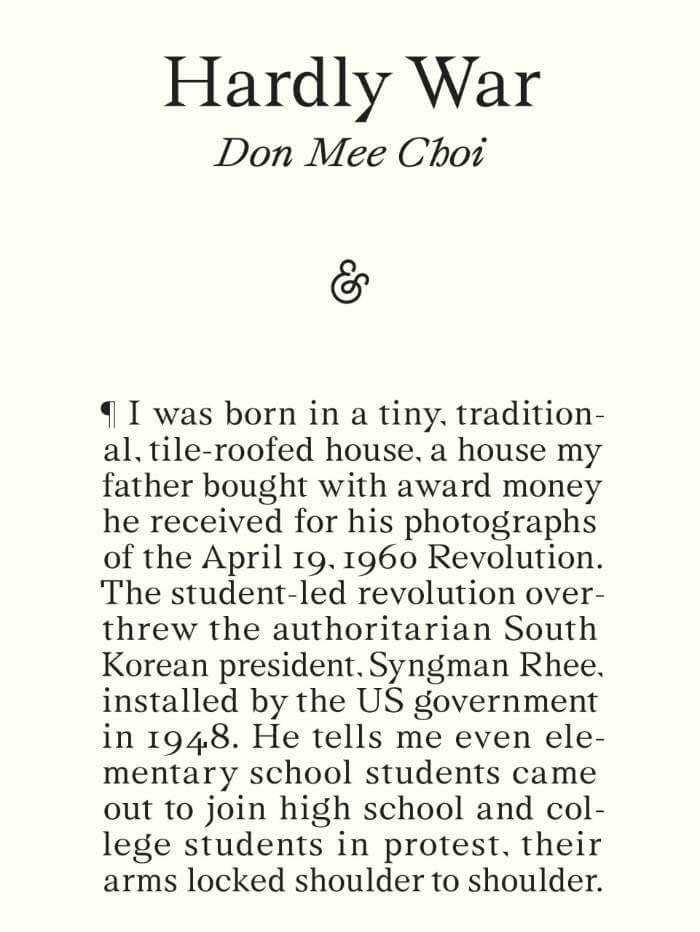
Hardly War
Hardly War, first published in the USA in 2016 and finally published in the UK in 2025, splices the personal and political to dizzying effect in a poetry fluid with forms and genres including reportage, memoir, opera libretto, archival photos and drawings. Using artefacts from Choi’s father, a professional documentary photographer during the Korean and Vietnam wars, she explores her paternal relationship and heritage. Here poetry and geopolitics are inseparable twin sisters, conjoined to the belly of a warring empire.
Choi’s KOR-US Trilogy (Hardly War and the subsequent DMZ Colony and Mirror Nation) brings us a new poetic language to learn. Suggestive and subtle in its connections and allusions, there is an exhilarating freedom in its playful form, all while looking straight at the brutality of colonialism and dictatorship.
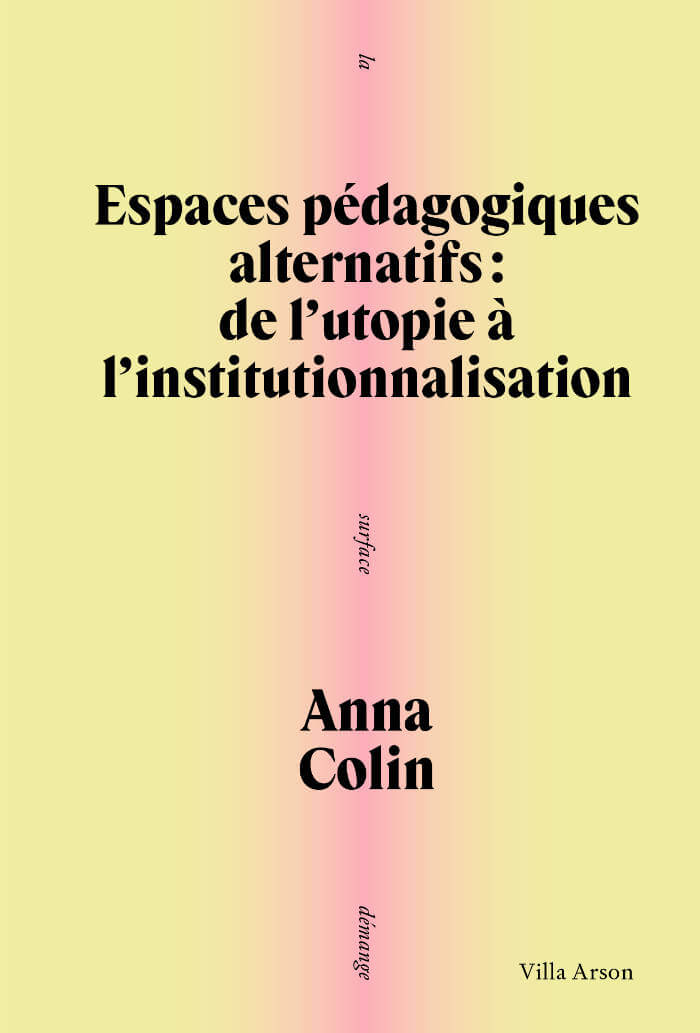
Espaces pédagogiques alternatifs
A critical exploration of the values and qualities inherent in independent educational organizations and the hurdles in the way of remaining "alternative" with the passing of time.
Anna Colin is programme director of the MFA Curating and co-director of the Centre for Art and Ecology, Goldsmiths, London. Besides Open School East, Anna worked as associate curator at Lafayette Anticipations, Paris (2014–20), associate director at Bétonsalon, Paris (2011–12), and curator at Gasworks, London (2007–10). She co-curated Chaleur Humaine, the 2nd Dunkirk Art & Industry Triennale (2023–24) on the relationship between energy and the arts since 1973. She holds a PhD in cultural geography and has a training in arboriculture.
Edited by Céline Chazalviel, Alice Dusapin, Sophie Orlando.
Texts by Anna Colin and Catherine Quéloz.
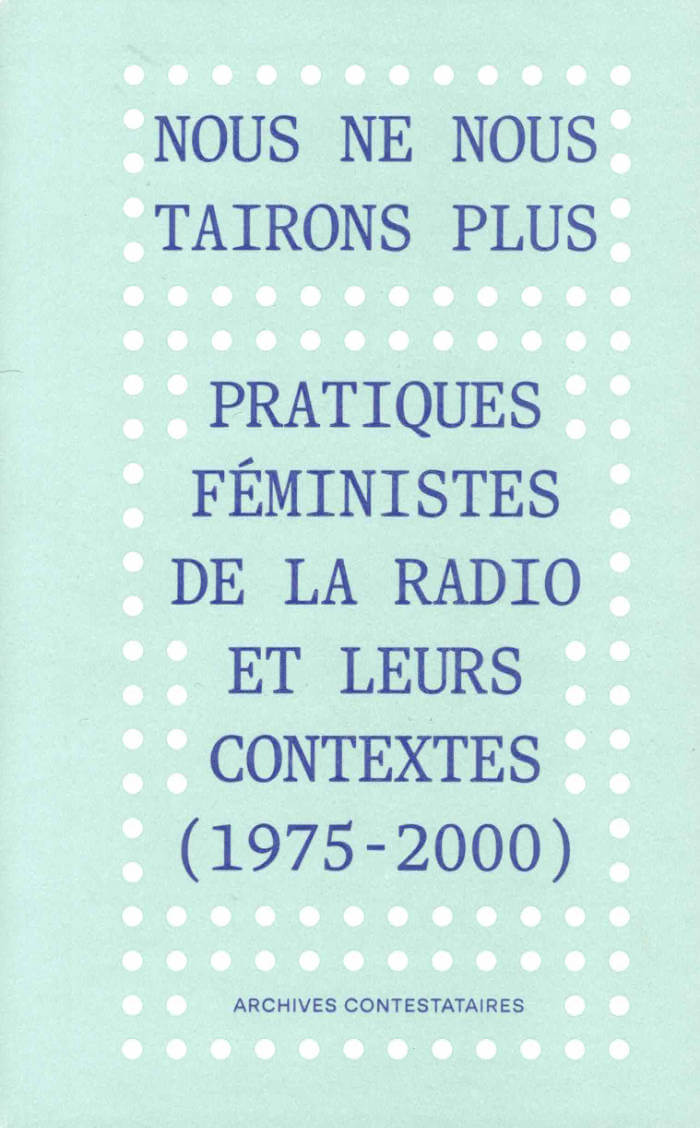
Nous ne nous tairons plus
La publication de l'inventaire des archives sonores de l'émission Remue-ménage marque la fin d'un long travail de numérisation, description et valorisation des émissions féministes diffusées sur Radio zones. En octobre 2023, nous avions organisé une journée d'étude sur les pratiques féministes de la radio. Devant l'intérêt des contributions proposées durant cette journée, nous avons décidé de les publier en un volume paru début 2025.
Le livre présente différentes expériences de radio-diffusion – d’abord pirates, puis sur les ondes des radios libres qui émergent au début des années 1980 en Europe. Par exemple, la radio Wellenhexen en 1976 à Zurich qui démontre de la vivacité de la scène contre-culturelle féministe et lesbienne. Ou encore les émissions Radio pleine lune et Remue-ménage, étroitement liées au Mouvement de libération des femmes genevois et diffusées pendant 20 ans sur les ondes de la station Radio Zones basée dans l’Ain.
L’ouvrage présente également la trajectoire de Nelly Trummel, fondatrice de l’émission anarcha-féministe Femmes libres sur Radio libertaire, et aborde la présence contrastée des femmes sur la radio de lutte Lorraine cœur d’acier qui émerge dans le cadre des mobilisations des sidérurgistes dans l’est de la France.
Comment la radio s’inscrit-elle dans les différents usages féministes des médias, pour constituer un outil de lutte politique ? La radio permet-elle l’expression et l’émancipation des femmes qui s’en emparent, ou au contraire, reproduit-elle des dominations ? Si ces appropriation féministe de la radio constitue l’exception dans la déferlante des radios libres, que cette exception nous apprend-elle sur la norme de médias dans lesquels les femmes sont dominées ?
Contributeur·ices : Juliette Volcler, Anne-Christine Schindler, Géraldine Beck, Fiona Prieur, Ingrid Hayes, Mathilde Leroy et Marc Colin.

Spells: 21st Century Occult Poetry
Spells are poems; poetry is spelling.
Spell-poems take us into a realm where words can influence the universe.
Spells brings together over forty contemporary voices exploring the territory where justice, selfhood and the imagination meet the transformative power of the occult. These poems unmake the world around them, so that it might be remade anew.
Kaveh Akbar, Rachael Allen, Nuar Alsadir, Khairani Barokka, Emily Berry, A.K. Blakemore, Jen Calleja, Anthony V. Capildeo, Elinor Cleghorn, CAConrad, Nia Davies, Paige Emery, Livia Franchini, Alexis Pauline Gumbs, Will Harris, Caspar Heinemann, Lucy Ives, Rebecca May Johnson, Bhanu Kapil, Amy Key, Daisy Lafarge, Dorothea Lasky, Francesca Lisette, Canisia Lubrin, Karen McCarthy Woolf, Lucy Mercer, Hoa Nguyen, Precious Okoyomon, Rebecca Perry, Nat Raha, Nisha Ramayya, Ariana Reines, Sophie Robinson, Erica Scourti, Sarah Shin, Himali Singh Soin, Tai Shani, Rebecca Tamás, Bones Tan Jones, Dolly Turing, Jane Yeh, Flora Yin Wong
Introduced by So Mayer
Afterword by Sarah Shin
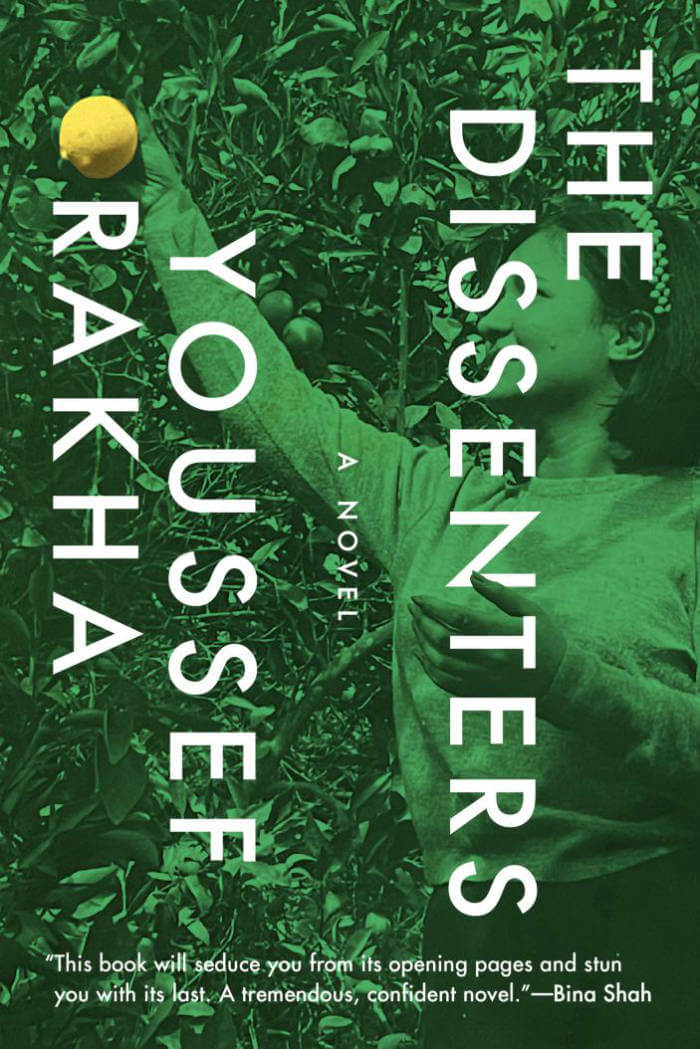
The Dissenters
A transgressive novel by an acclaimed writer that spans seventy years of Egyptian history.
Amna, Nimo, Mouna—these are all names for a single Egyptian woman whose life has mirrored that of her country. After her death in 2015, her son, Nour, ascends to the attic of their house where he glimpses her in a series of ever more immersive visions: Amna as a young woman forced into an arranged marriage in the 1950s, a coquettish student of French known to her confidants as Nimo, a self-made divorcee and a lover, a “pious mama” donning her hijab, and, finally, a feminist activist during the Arab Spring. Charged and renewed by these visions of a woman he has always known as Mouna, Nour begins a series of fevered letters to his sister—who has been estranged from Mouna and from Egypt for many years—in an attempt to reconcile what both siblings know about this mercurial woman, their country, and the possibility for true revolution after so much has failed.
Hallucinatory, erotic, and stylish, The Dissenters is a transcendent portrait of a woman and an era that explodes our ideas of faith, gender roles, freedom, and political agency.
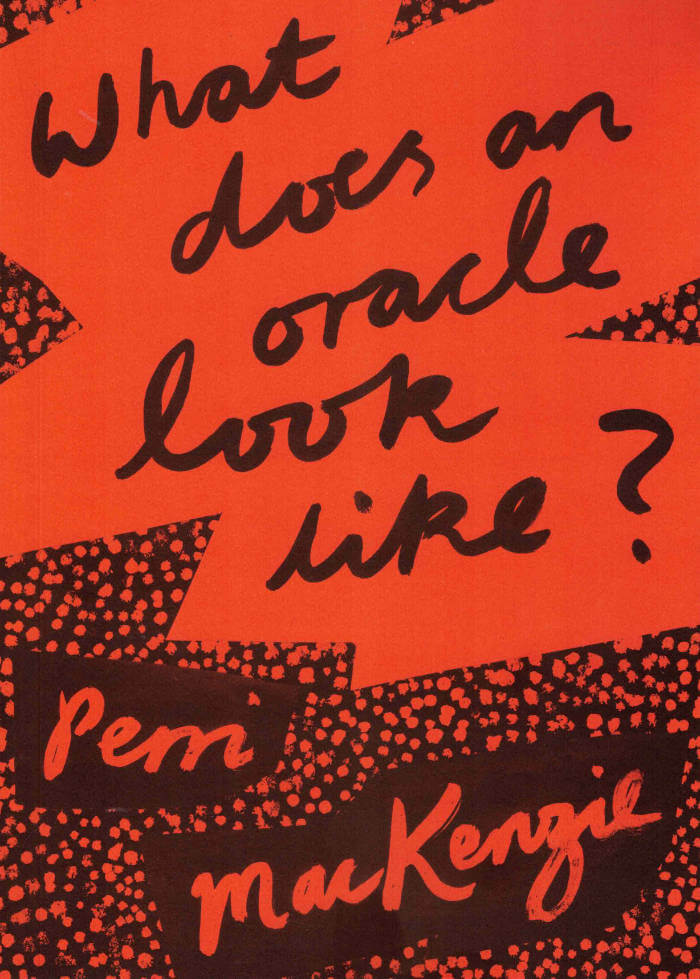
What does an oracle look like?
What does an oracle look like? gathers essays and drawings made by Perri MacKenzie between 2020 and 2024, themed loosely around pottery painting and vocal expression. The drawings, rendered in splashy India ink and collage, range from expressive sketches to theatrical still lives and experimental bandes dessinées. The book presents for the first time the essay Cathedral. Part memoir, part literary/sonic investigation, it meditates on the vocal texture of a Hollywood actor.
Designed by Ilke Gers.

The Rose
Drawing on the history of “romance” as the troubadours knew it and the titular flower’s ancient allegories for sexuality and mystery, Reines plunges into feminine archetypes to explore masculine pain: “I have always liked helpless / & terrible men because they break my mind.” In these poems, inherited ideologies of gender performance are replaced with bold vulnerability: paradoxes of power and surrender transmute the speaker’s understanding of suffering, desire, and the soul.
The voice in The Rose is wry and bare, approaching the connection between erotic love and spirituality with humor. Investigating war, maternity, violent sensuality, and the role of language in magical acts, Reines is unafraid to uncover the “secret / & terrible shovelings / Of love,” and the result is a bloody and pulsing, sexy and unabashed bloom.

WARMAN SCHOOL: UNACCREDITED & PROUD
WARMAN SCHOOL: UNACCREDITED & PROUD documents 8 years of writing prompts, movement activities, research, and experiences from LA Warman’s iconic anti-school, Warman School. Over 1500 students have passed through the hallowed halls of a Warman School Zoom room; you can also attend school! The book describes lore surrounding the founding and growth of the school as well as advice on how not to make money. You can also be a self-directed student and follow prompts from the most popular courses at the school: death, loneliness, erotics, god, and poetry. Part workbook and part lousy advice column: this book gives you everything you need to learn!
LA Warman also unearths her fucked philosophies for you to judge. The book centers around the idea that all knowledge is already inside your body, and through movement and writing activities, you can begin to open up this abundance. LA gives away every prompt she has used in class and every lesson plan so you can do class in your own space and time. You are the teacher. You are the student. You are the school.
LA Warman is a poet, sound artist, and teacher based in New York City. Her most recent poetic novella, titled Dust was published in 2022 by Inpatient Press. Warman is the author of Whore Foods, an erotic novella which received a Lambda Literary Award in 2020. She founded Warman School, a non-accredited and body-based learning center. The Warman School has taught over 1500 students online and in person. She teaches topics such as erotics, death, depression, and god. Pitchfork named her piece ADMSDP one of the top 100 songs of 2020. She has had performance and installation work in shows at MOCA Cleveland, ICA Philadelphia, Time-Based Art Festival, Poetry Project, and Open Engagement. Warman has presented performative poetics research at Brown University, Hamilton College, Reed College, Hampshire College, and others. Her work has been featured in media like Interview Magazine, Vulture, poem-a-day, Out Magazine, and Mousse Magazine.
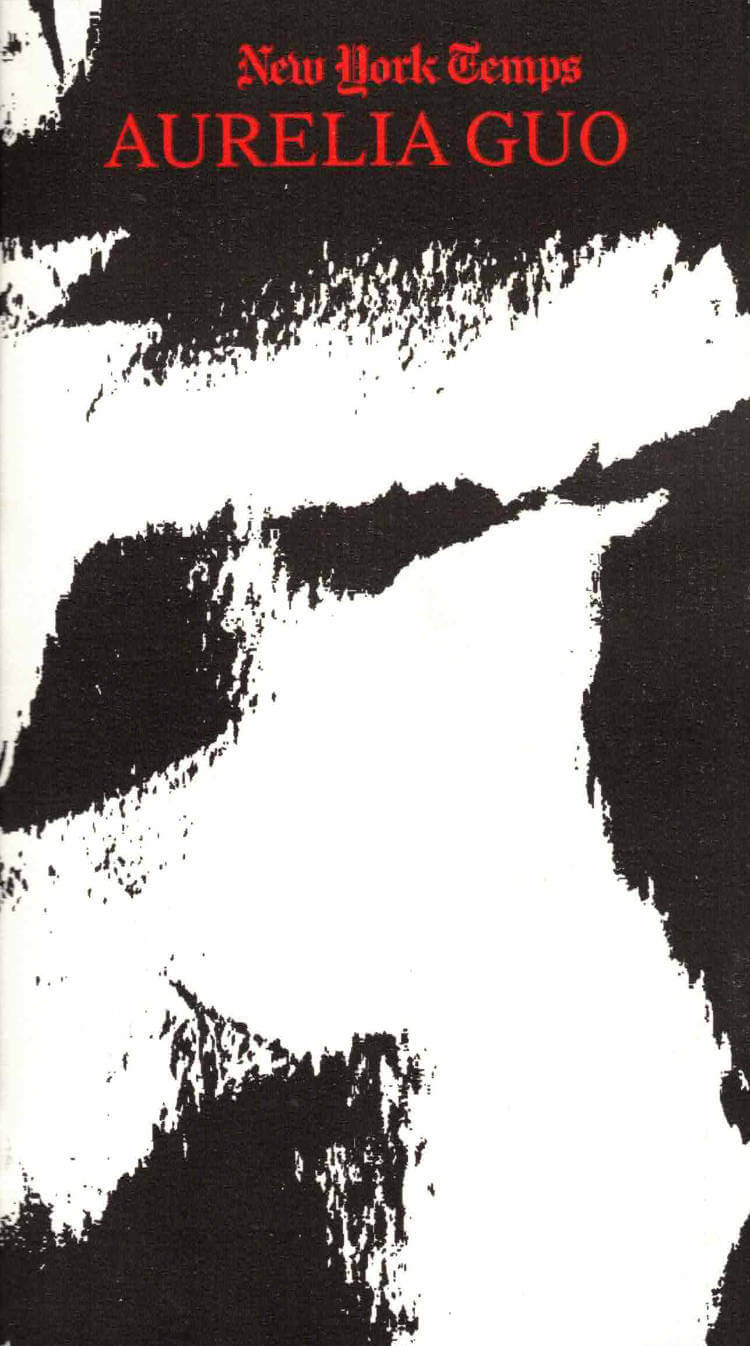
New York Temps
Composé à la fois de récits personnels, de citations et de collages provenant notamment du New York Times, New York Temps suggère une discontinuité des états intérieurs, accentuée par la multiplicité des orateur.ices : les voix se succèdent à elles-mêmes, sont à chaque moment ce qu’elles n’étaient pas celui d’avant, apprenantes et à l’écoute de tout ce qui n’est pas elles. À travers des questions d’intertextualité et de sampling en poésie, le texte porte en lui une violence immanente – rendue plus intérieure, faite sienne –, une gêne, non seulement ressentie, mais aussi imposée, comme une protestation.
Titre original : NYT. Publié pour la première fois chez Gauss PDF en 2018. Traduit de l’anglais par Salomé Burstein.
Aurelia Guo est écrivaine et chercheuse à Londres. Elle est également l’autrice de World of Interiors (Divided Publishing, 2022).

Unsex Me Here
If Aurora Mattia is a switchboard operator, then Unsex Me Here is her call log. Please hold. There’s someone on the other line. A spider, a sibyl, an angel, a mermaid, a goddess, or an ex-girlfriend.
Unsex Me Here is a prayer book tied together by the strings of a corset. Glamorous ramblers, haunted by the sense of another world drawing near, wander in and out of its inexplicable twilight. From a West Texas town with a supernatural past to a stalactite cavern in the birthplace of Aphrodite, from hotel rooms to gardens to the far horizon of a thought, they seek the source of the disturbance in their minds. Heartbreak is not so far from rapture; holy babble is another kind of gossip. Every pilgrimage is as dense with symbolism as it is refined by desire.

I Love Shopping
Chickens have a collective soul. Heaven is full of the skateboarders you kissed in middle school. If the algorithm is its own hell, Lauren Cook, author of the critically (and uncritically) acclaimed Sex Goblin, stands in front of it fully armored. I Love Shopping invites its readers to inhabit a world just like ours, reflected through a big, benevolent funhouse mirror.
First published in a limited edition, this is the first trade edition of the cult classic.

The Spiritual Hunt
A long lost poem purportedly by Rimbaud is finally made available in English.
Referenced only in a few letters of Paul Verlaine, The Spiritual Hunt is Arthur Rimbaud's forgotten masterwork, a poem in five parts that explored the mystic philosophy that guided the young poet's heart and hand. Considered lost for years, a typewritten manuscript appeared in Paris in the late 1920s, circulating around a close-knit group of booksellers, poets, and playwrights. Yet it wasn't until 1949 that Mercure de France took the initiative to publish the unauthenticated galley and unleashed a literary controversy that shook France. Sides were drawn, with Andre Breton leading the charge of forgery, calling the work an utter hoax, and others defending it as legitimate and an essential key to understanding Rimbaud and his work. Bookstores were raided for copies, critics were skewered in journals, and tempers flared on radio and in print, but no conclusive judgement could be drawn and Mercure de France withdrew the work from publication and pulped all the copies they could find.
Now, seventy-five years after its initial imbroglio, The Spiritual Hunt is available in English for the first time with a facsimile letterpress edition of the original. Featuring Pascal Pia's original introduction along with an edifying afterword by translator Emine Ersoy.
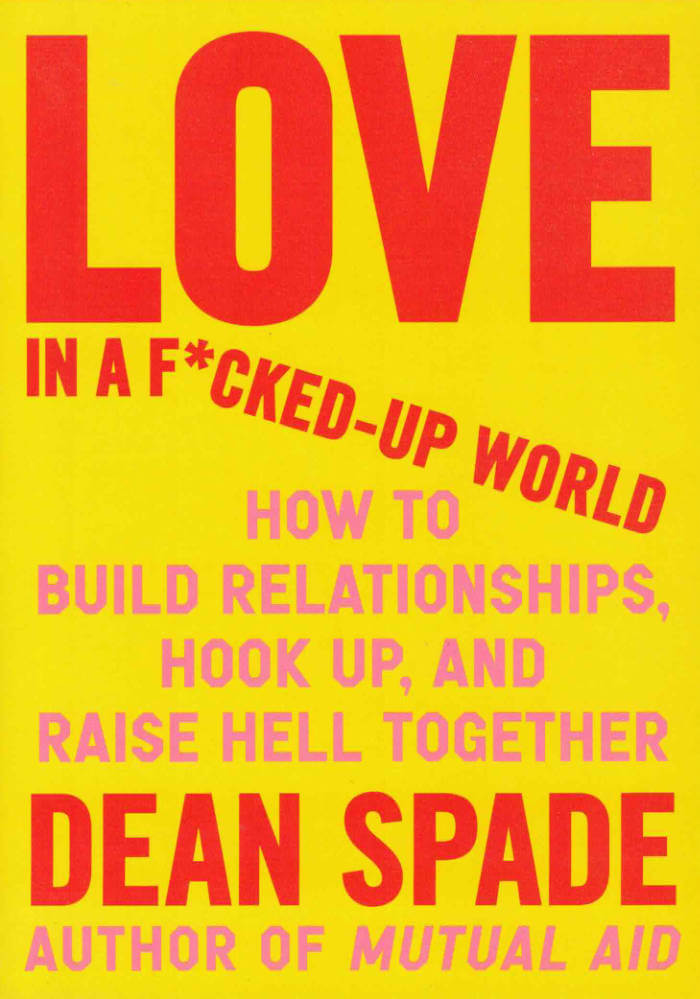
Love in a F*cked-Up World
Around the globe, people are faced with a spiraling succession of crises, from the pandemic and climate change-induced disasters to the ongoing horrors of mass incarceration, racist policing, endemic gender violence, and severe wealth inequality. Many of us feel mobilized to organize and collectively combat these issues on both a personal and political level, often dedicating our lives to the forwarding of progressive ideas and the daunting goal of trying to bend the world toward justice.
But even those of us who long for change seem to have trouble when it comes to interpersonal relationships. Too often we think of our political values as outward-facing positions again dominant systems of power. Rarely, if ever, do we pursue the same kind of justice close to home, in our personal connections. Many activist projects and resistance groups fall apart because people treat each other poorly, trying desperately to live out the cultural myths about dating and relationships that we are fed from an early age.
How do we divest from the idea that one romantic partner will be the solution to all our problems? How do we separate our expectations of love from the troubling dynamics left to us by our parents? How do we bring our best thinking about freedom and justice into step with our desires for healing and connection?
Lifelong activist and educator Dean Spade dares us to decide that our interpersonal actions are not separate from our politics of liberation and resistance. Love in a F*cked-Up World is a resounding call to action and a practical manifesto for how to combat cultural scripts and take our relationships into our own hands, preparing us for the work of changing the world.

Airless Spaces
Shulamith Firestone was twenty-five years old when she published The Dialectic of Sex, her classic and groundbreaking manifesto of radical feminism, in 1970. Disillusioned and burned out by the fragmented infighting within the New York City radical feminist groups she’d helped to found, when her book hit the bestseller lists, Firestone decided against pursuing a career as a “professional feminist.” Instead, she returned to making visual art, the profession that she’d trained for. She wouldn’t publish anything again until Airless Spaces, in 1998.
Long before her first hospitalization for paranoid schizophrenia in 1987, Firestone had fallen off the grid and into precarity and poverty. For the next decade, she would move in and out of public psychiatric wards and institutions. Conceived as a series of vignettes about institutions and identity, Airless Spaces is a subtle and deeply literary work. Embedded as a participant-observer, Firestone moves beyond the spectacular and frightening surfaces of institutional life to record individual lives and acts of cruelty and kindness. The existence that she depicts is a microcosm of the world beyond.
After they raised her dose to 42 mg. of Trilafon, Lucy very nearly fainted. She felt a rush of bad sensation comparable to her mental telepathy when her grandmother died. ... But there was a good aspect to fainting too. As she was about to lose consciousness, she felt an overwhelming relief. The black velvety edges of the swoon. If only she could faint all the way, black out, and never wake up again ...
Introduction by Chris Kraus
Afterword by Susan Faludi

Discontent Issue 5
Reportage, new writing, photography and art from Palestine and Lebanon.
Contributors include Adam Rouhana, Ahmad Alaqra, Alaa Mansour, Areej Mahmoud, Elissa Sophia Assaf, Farrah Berrou, Hala Alyan, Lara Sheehi, Mariam Barghouti, Myriam Boulos, Nada Homsi, Nader Bahsoun, Noa Avishag Schnall, Wahaj Bani Moufleh, Yasmin Huleileh, and Yazan Al-Saadi.

We Don’t Live Here Anymore
A fragmented reflection on movement, absence, and the unraveling of identity within the shifting landscapes of departure and return. Tarren Johnson explores the tension between private longing and public expression, where moments of love and vulnerability emerge in transient encounters.
Tarren Johnson grew up in North County San Diego, where she began dancing and writings a child. She continued her studies at CalArts in Los Angeles before moving to Europe, where she built a decade-long career in the performing arts. Her debut book of poetry, We Don’t Live Here Anymore, also serves as the foundation for the stage work of the same title.